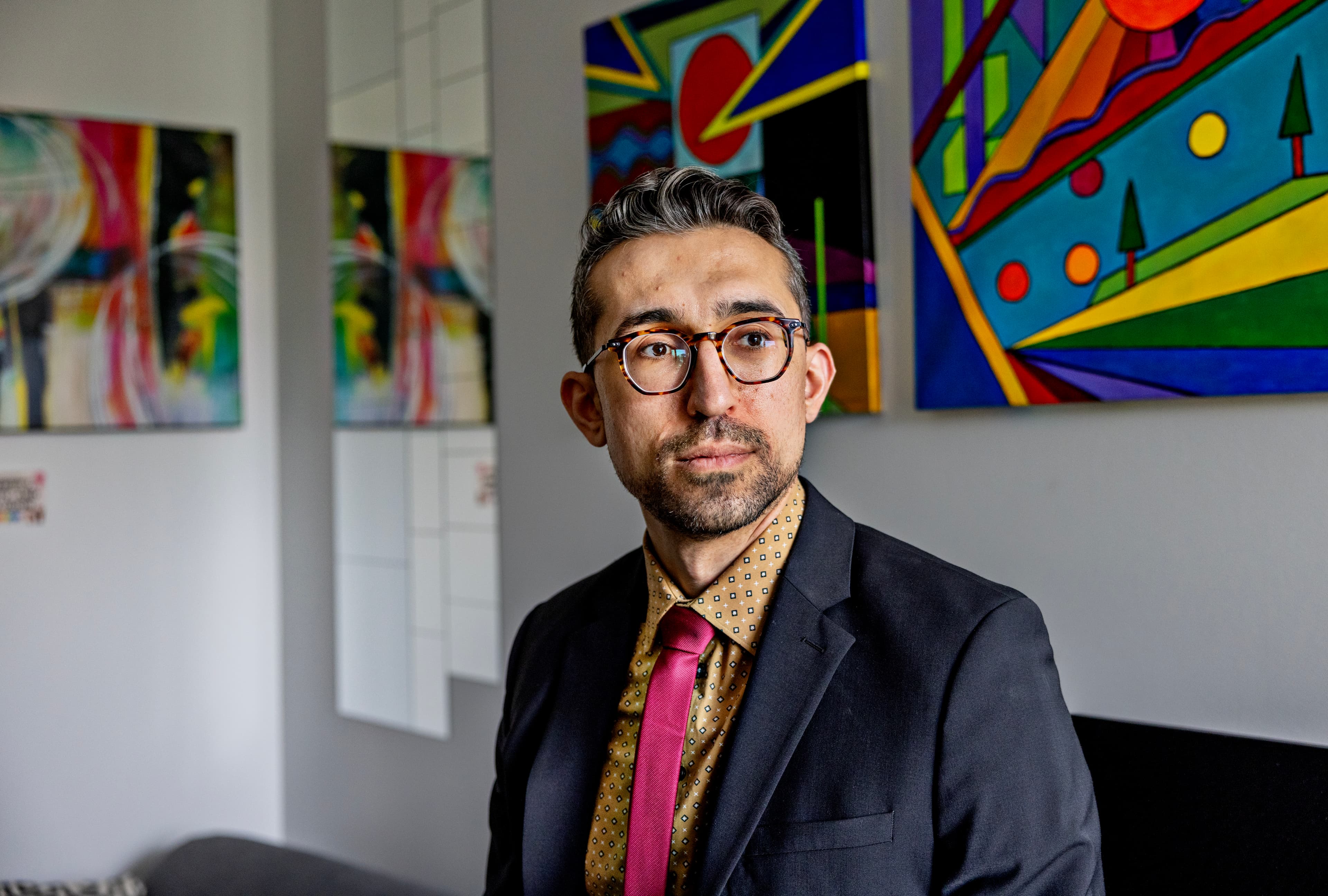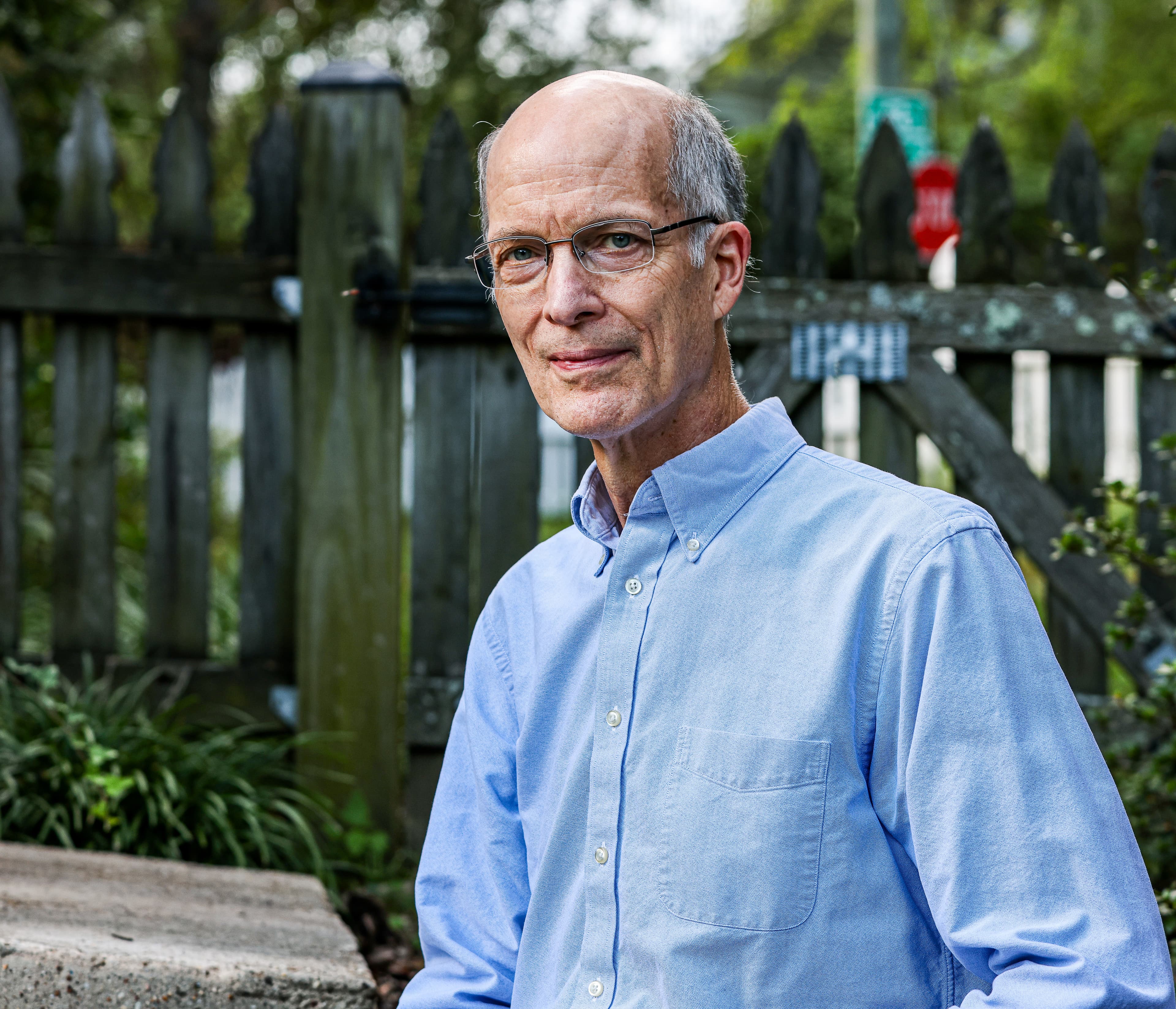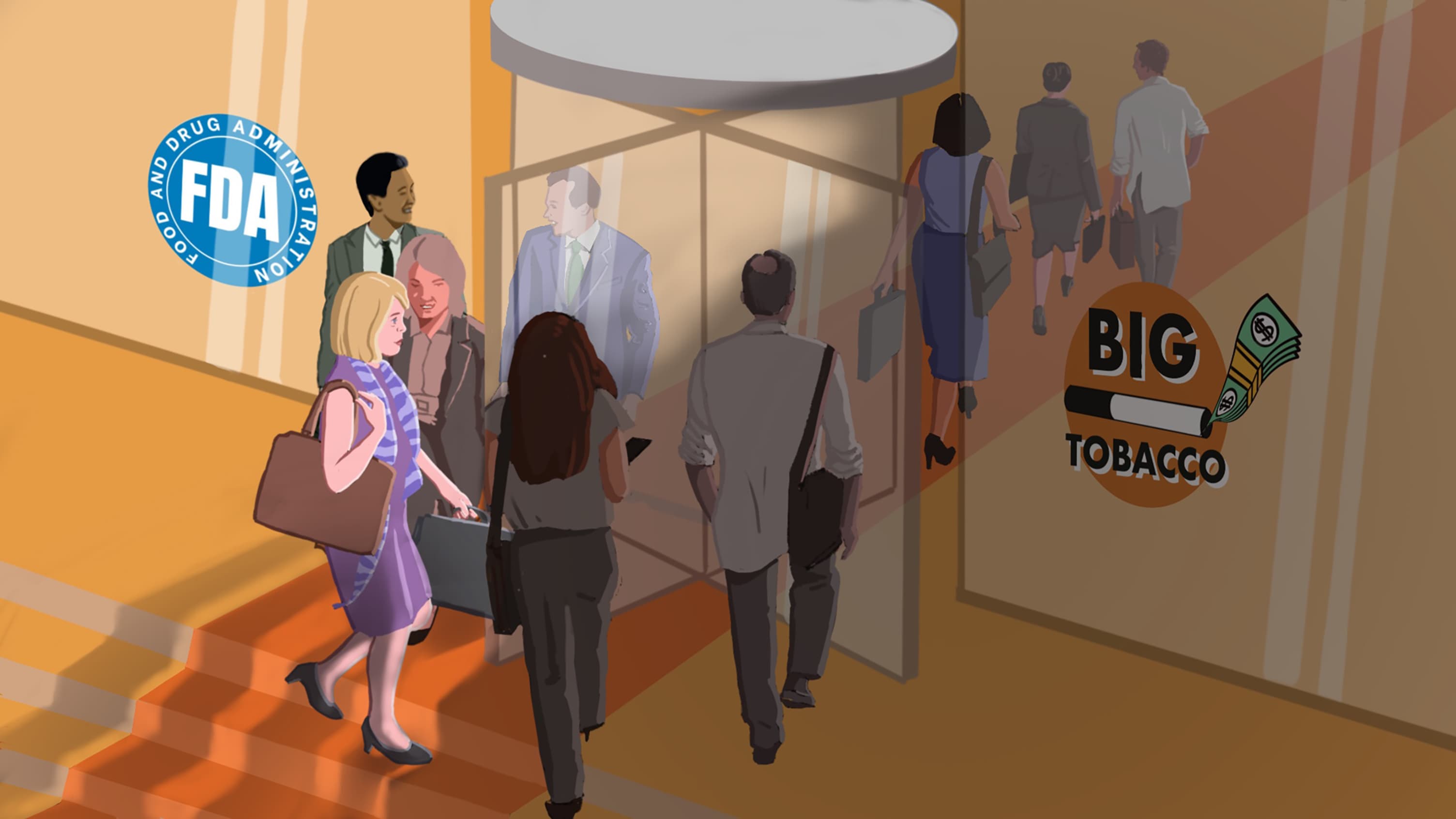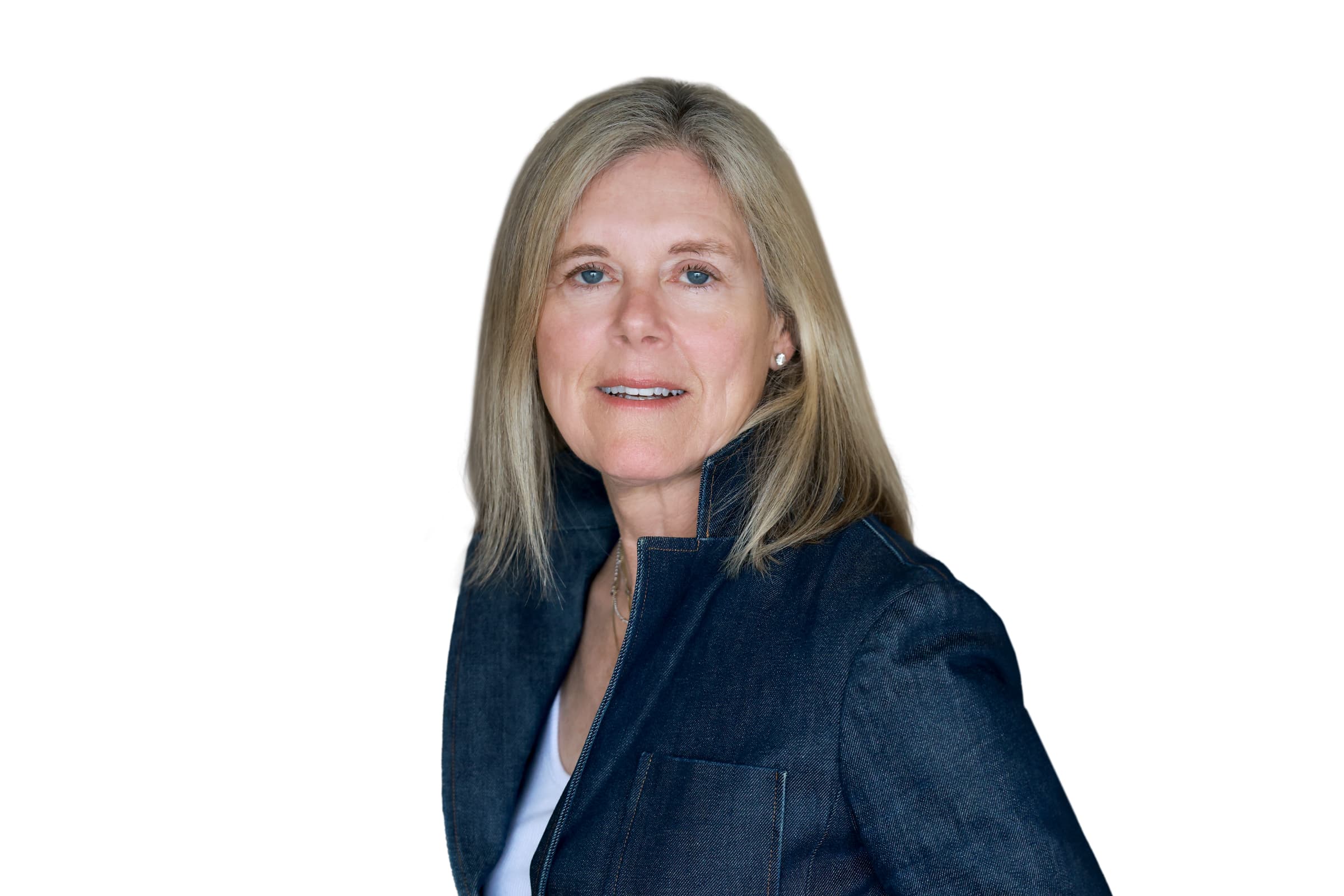This story is published in partnership with STAT.
Perham Gorji was a career government lawyer, helping to lead the U.S. Food and Drug Administration’s battle against tobacco and e-cigarettes.
He was there as the agency contemplated a ban on menthol cigarettes, and as vapes of all shapes and sizes flooded the market, hooking a new generation on nicotine.
Last year, Gorji followed a well-trodden path for Washington, D.C., lawyers. He traded his government job for a high-paying position in private practice, working on behalf of clients who want an insider’s view on how to navigate the FDA — and in some cases, on how to dismantle and weaken regulations they don’t like.
Gorji joined DLA Piper, one of the biggest law firms in the world, as a litigation partner, adding to its FDA team, which gives “strategic counseling and advocacy” to tobacco companies and other industries overseen by the agency.
One of his new clients is tobacco heavyweight Philip Morris International, which is seeking FDA approval of its latest iteration of IQOS, a smoking device that heats, rather than burns, tobacco.
The FDA, according to its commissioner, is in the midst of “an epic struggle” with the tobacco industry over vaping and other next-generation nicotine products. “We are in a legal battle every single day,” Commissioner Robert Califf told an FDA oversight organization last year.
As it wages court battles, including one currently before the U.S. Supreme Court, the FDA faces an especially frustrating and daunting challenge: opponents who are represented by former in-house lawyers who helped craft and defend the same regulations the industry is fighting.
In the last 15 years, nearly two dozen FDA lawyers have left the agency and its Center for Tobacco Products to advise, litigate for or work with the tobacco and vaping industry, a review of bios, court documents, public forums, published works, company websites and federal government records by The Examination found.
“It seems like every time we get sued in the tobacco industry, a former FDA lawyer is leading the lawsuit,” Califf said in his remarks to the oversight organization.
The FDA’s Office of the Chief Counsel has about 160 attorneys. The number doesn’t include dozens of other lawyers and regulatory counselors — who also advise on legal matters but are not necessarily lawyers — and work for other divisions within the agency, including the Center for Tobacco Products.
The stakes are high as the tobacco industry makes products linked to more than 8 million deaths a year worldwide — and as the industry steps up its legal challenges to regulations on e-cigarettes and other newer nicotine products. The FDA has faced dozens of such cases since 2021.
Aside from those working directly with the industry, about 50 other former FDA lawyers have identified themselves over that same time as counselors to clients on FDA regulatory matters such as “life science” issues, which can include tobacco and e-cigarettes. They also say they represent medical device manufacturers, pharmaceutical, food and cosmetic companies and the booming cannabis industry.
Daniel Aaron, a former FDA attorney, says lawyers who’ve left the agency to work on behalf of the tobacco industry can have a powerful impact on what lands on store shelves.
“It’s a huge advantage to getting your product to market.” said Aaron, now a University of Utah law professor. “Ex-FDA lawyers know what the agency is worried about, and how a client can maximize its options. They know not just what the law is, but they know how the FDA will enforce the law.”

In an interview, Gorji said he doesn’t see himself as “joining the other side.” He told The Examination that Philip Morris International is at “the forefront of trying to help people transition off the worst of the worst products” with IQOS. He said, moreover, a small portion of his work is focused on tobacco; most of his practice is medical products and food manufacturers.
Gorji is one of two top FDA lawyers to leave the agency for a major law firm representing the tobacco and vaping industry in the past year. This year, Michael Varrone joined Sidley Austin, whose clients have included Juul Labs and now Global Action To End Smoking, a nonprofit funded for years by Philip Morris International that advocates for e-cigarette use over traditional cigarettes.
Two other former FDA lawyers have been part of the legal team representing e-cigarette maker Wages and White Lion Investments in a lawsuit that challenges how the FDA evaluates e-cigarette applications — a case now before the Supreme Court.
Matthew Myers, longtime public health advocate and former president of Campaign for Tobacco-Free Kids, said some former FDA lawyers are working at every level to thwart any new tobacco regulations.
They know how to “throw sand in the gears of the process,” he said.
‘Surprise Switcheroo’
Jessica Tierney joined the FDA’s Center for Tobacco Products in 2011, just out of law school. There, she was part of a unit that churned out warning letters to manufacturers and retailers accused of illegally making and selling tobacco products.
The Center for Tobacco Products had only recently come online. It was the newest of eight centers that regulate consumer and medical products, including pet food, cosmetics, medical devices and pharmaceuticals. Previously, laws and regulations were enacted piecemeal to oversee tobacco, such as one in 1970 that banned cigarette advertising on TV and radio.
In 2016, as e-cigarette use was skyrocketing, the FDA gained authority to regulate vaping devices and the nicotine-laden liquids that accompany them. Tierney’s enforcement division was part of the center’s overall effort to keep cigarettes, and now e-cigarettes, out of the hands of minors.
It was a critical moment. Teens were vaping in record numbers, and rates had tripled among high school and middle school students. In 2018, the Surgeon General issued an advisory calling youth vaping an epidemic. Critics blamed the FDA, saying the agency had been slow to regulate e-cigarettes.
“Many public health advocates have been bewildered and frustrated by the slow pace of federal rulemaking and the FDA’s failure to address even the most basic tobacco regulatory problems,” wrote Joelle Lester, executive director of the Public Health Law Center, in a 2021 review of the FDA’s tobacco regulation.
In 2020, with pending court deadlines and unregulated vaping products flooding the market, the tobacco center began reviewing applications from hundreds of manufacturers seeking approval to sell 6.5 million e-cigarette products.
Tierney oversaw a team working with government contractors to inspect retailers, according to her bio and former FDA coworkers. Many were selling e-cigarettes that hadn’t been approved by the FDA and came in flavors that were especially popular with teenagers.
Tierney was out-front on the enforcement issue, giving an FDA webinar to shop owners explaining the hearing process that follows allegations of selling tobacco products to minors and other violations.
In October 2021, the FDA approved the sale of three e-cigarette products – and denied millions. The agency determined that the vast majority of manufacturers had failed to show that possible benefits to adult smokers looking to quit outweighed the threat posed to young people. Lawsuits followed as e-cigarette makers appealed the FDA’s decisions.
Around the same time, Tierney took a job with Thompson Hine, one of several law firms defending e-cigarette makers. “I look forward to helping clients comply with FDA regulations and demystifying the agency and its policies and procedures,” she said in a press release.
Tierney got right to work. She was named co-counsel of a legal team representing e-cigarette makers Pop Vapor, Wages and White Lion, Avail Vapor, and Magellan Technology, among others, court records show. Some of her new clients at Thompson Hine had been cited by her previous enforcement division for illegally marketing e-cigarettes.
On behalf of her new employer, she submitted a records request seeking internal documents from the agency showing how another company won approval for its e-cigarette products. She then followed up with her former employer with a phone call and an email, according to documents obtained through a Freedom of Information request.
I look forward to helping clients comply with FDA regulations and demystifying the agency and its policies and procedures.
Jessica Tierney, Thompson Hine
Texas-based Wages and White Lion had sought approval for its vaping products with catchy names like “Strawberry Astronaut,” “Mother’s Milk and Cookies” and “Queen Cake.” In the fall of 2021, its application was among the hundreds denied by the FDA.
Tierney and lead lawyer Eric Heyer sued the FDA on behalf of Wages and White Lion, arguing the agency “pulled a ’surprise switcheroo’” imposing “new requirements” on the vaping company without proper notice. A three-judge panel on the 5th Circuit Court initially ruled for the FDA, but the full court later reversed the decision. The Supreme Court in July agreed to hear the case; arguments are scheduled for Dec. 2.
Tierney has since moved to the Washington, D.C. office of Jones Day, one of the country’s larger law firms whose major clients include R.J. Reynolds. She states on her profile that she “regularly advises clients on bringing to market novel food, tobacco, medical device, and drug products.” Tierney, reached by phone, declined to comment and did not respond to emails.
Tapping again into FDA alumni, in 2023 Thompson Hine also hired James Fraser, who had spent five years as an associate chief counsel handling, among other matters, complaints against retailers accused of selling cigarettes to minors. At his new firm, Fraser jumped in where Tierney left off as co-counsel on several e-cigarette cases including Wages and White Lion, Avail Vapor and Pop Vapor.
Thompson Hine was counting on Fraser’s FDA experience when they hired him, according to a company press release. “He has a unique and valuable insider’s insight that enables him to offer clients informed advice on FDA regulatory issues and effectively represent them in related litigation when necessary,” law firm partner Francis “Chip” Purcell Jr. wrote.
Cooling-off Period
FDA rules prohibit senior-level employees from communicating with or appearing before the government on matters in which they were personally involved, such as investigations, claims and cases.
Federal post-employment rules also bar former employees from communicating with or lobbying a federal employee for two years on behalf of a client or employer under certain circumstances. That said, employees are allowed to work “behind the scenes” advising clients, according to the FDA’s post-employment guidelines. (American Bar Association rules go a step further and forbid lawyers from working behind the scenes unless they get a waiver.)
Michael Felberbaum, an FDA spokesman, said in an email, “There are nuances to the post employment rules that require careful analysis depending upon the specific factual circumstances.”
For example, Fraser, who defended pharmaceutical companies before joining the FDA’s chief counsel’s office, began representing e-cigarette makers less than two years after leaving the FDA. Available public records did not indicate that any actions by Fraser or other former FDA attorneys constituted a violation of policies. The FDA did not answer questions about any former FDA lawyers now representing clients suing or going before the agency.
In an email exchange with The Examination, Fraser downplayed his five years at the FDA’s chief counsel’s office, saying he was one of 100 associate chief counsels with minimal if no decision-making authority. He said he complied with both the “spirit and the letter of the law” regarding post-employment conflicts of interest. “While I was at FDA, I neither participated personally in nor had official responsibility” over e-cigarette cases relating to companies that he now works on behalf of in private practice, he said in an email.
Ethics experts say post-employment federal regulations need strengthening.
Those [FDA] regulations are super, super narrow and should be broadened if we were truly interested in preserving independent government.
Genevieve Kanter, University of Southern California professor
“Those [FDA] regulations are super, super narrow and should be broadened if we were truly interested in preserving independent government,” said Genevieve Kanter, a professor at the University of Southern California who co-published a study in 2023 on the revolving door in health care regulation.
Kanter’s study focused specifically on conflicts of interest of employees at the highest level of the U.S. Department of Health and Human Services; It found that 38% percent of the political appointees from the FDA went into private industry, the fourth highest out of roughly two dozen offices and divisions.
Early on at the Center for Tobacco Products, staff attorneys raised concerns internally about conflicts of interest for lawyers who worked on tobacco matters at the FDA and then represented the tobacco industry when they left the agency. In interviews, these former FDA lawyers said their colleagues have relationships with their former coworkers and know inside issues and legal strategies that could help the tobacco industry looking to tamp down any new regulations.
Eric Lindblom, director of the Center for Tobacco Products’ Office of Policy from 2011 to 2016, proposed blocking former staff from working for the tobacco industry for at least one or two years, in all cases, after leaving the policy office. “I thought it was really important that we had that independence,” said Lindblom, now a senior scholar at Georgetown University’s O’Neill Institute.
“I also wanted that done, not only to ensure greater independence or freedom from potential industry influence, but also to help screen out potential employees who might be planning on or open to working for the industry after the (Center for Tobacco Products),” Lindblom said.
The proposal went nowhere.

‘Painful moments’
Over the years, other staffers, such as scientists, have left the FDA to work for vaping and tobacco companies as well as opioid makers. Their defections have had significant consequences.
Most recently, as chronicled in Patrick Radden Keefe’s book, “Empire of Pain,” a top FDA official who led the approval of Purdue Pharma’s opioid OxyContin then left the agency for the company and a $400,000 compensation package. And public health advocates are still smarting over the FDA’s former top tobacco scientist, Matthew Holman, who went to work for Philip Morris International in 2022 not long after signing off on an earlier version of the company’s IQOS tobacco device, according to FDA documents. Adding to Philip Morris International’s top strategic team is former FDA chief of staff, Keagan Lenihan, who left the agency in 2021 and joined the tobacco company the following year to run its U.S. political and regulatory affairs.
Even the most senior FDA officials have sold their services to the tobacco industry. In the 1990s, former FDA commissioner Charles Edwards testified before the U.S. Senate about efforts by the FDA to regulate tobacco. Agency oversight wasn’t necessary, he said. Edwards was getting paid at the time by Philip Morris, according to a book, “A Question of Intent,” written by David Kessler, the FDA commissioner at the time of the hearing.
Edwards’ testimony was “one of the most painful moments for me, personally,” wrote Kessler, who had worked closely with Edwards.
In 2018, the fledgling Juul Labs took a cue from big tobacco players as it faced increased scrutiny over minors using its flavored e-cigarettes. To help with its growing legal problems, Juul hired a former FDA chief counsel, Gerald Masoudi, as its general counsel.
Masoudi led Juul’s legal defense when it was under fire for selling e-cigarettes to minors. Masoudi has since returned to Covington & Burling, a law firm where he previously worked that has been closely aligned with the tobacco industry for nearly four decades. (Another former FDA chief counsel, Peter Hutt, is a longtime partner at Covington and also has represented the tobacco industry.)
FDA Commissioner Califf was hit with conflict-of-interest allegations when President Joe Biden nominated him to take the helm of the FDA once again in 2022. Califf briefly served as the commissioner from February 2016 through January 2017 when President Donald Trump took office. Califf, a cardiologist, then returned to Duke University School of Medicine where he previously served as vice chancellor. While at Duke, Califf received consulting fees from pharmaceutical companies, among other health care-related companies.
During Senate confirmation hearings in 2022, Califf came under pressure for accepting pharmaceutical money. Before he was confirmed, in a letter to Sen. Elizabeth Warren, Califf committed to forgoing getting paid for four years after leaving the FDA by any pharmaceutical or other company whom he had direct contact with while at the agency.
Califf declined to be interviewed for this story.
Outgunned
When the FDA started regulating tobacco in 2009, the agency relied on lawyers from other FDA units with little to no tobacco-related experience, or young lawyers right out of law school like Tierney, former staffers say. Public health advocates helped get agency staff up to speed on key tobacco issues, but the lawyers were still outgunned. Through a successful 2012 federal lawsuit, seasoned tobacco lawyers representing R.J.Reynolds and other tobacco companies torpedoed the agency’s first big regulation to require more descriptive warning labels on cigarette packages.
FDA lawyers have proceeded cautiously to introduce new tobacco regulation, critics said.
The agency has taken more than a decade to advance a regulation that would eliminate menthol cigarettes — which public health advocates say could save thousands of lives. The FDA issued a proposed rule to prohibit menthol cigarettes in October 2023, but it was shelved earlier this year by the Biden administration after heavy lobbying by tobacco companies and other groups. Public health groups filed a new lawsuit this year, doubling down on their claims that the FDA has “unduly delayed” action on a menthol ban.
“The FDA seems particularly overcome by the fear of litigation from tobacco product manufacturers,” Desmond Jenson of the Public Health Law Center wrote in an FDA regulatory review. “A fear that is well earned to a degree but does not justify the lack of action on many important policies,” he said.
The FDA declined to comment on the menthol litigation. In a speech last month at a global tobacco conference, the tobacco center’s director, Dr. Brian King, said getting the menthol rule to “the finish line as expeditiously as possible” is a priority; he lamented what he described as a “very tortured bureaucratic” rule-making process.
Payday
After gaining FDA experience, lawyers can move to a major law firm or corporation, significantly increasing their salaries.
A lawyer’s salary in the FDA’s chief counsel’s office, for example, starts at around $83,000 while a first-year lawyer at a firm, by comparison, made on average $200,000 a year in 2023, according to the National Association for Law Placement.
$83,000
lawyer's starting salary in the FDA’s chief counsel’s office
$200,000
lawyer's first-year average salary at a firm in 2023
Once a partner, the salary jumps further. The average partner at DLA Piper earns $1.3 million a year, according to the most recent data from American Lawyer – more than six times what the former FDA litigator Gorji made when he left the agency.
FDA attorney defections to the private sector are not frowned on by everyone, but working on behalf of the tobacco industry is where many draw the line.
Subscribe to our newsletter
Global health reporting, straight to your inbox
Stuart TenHoor, a D.C.-based recruiter, said, “If you are with the FDA, you care about public health, that’s what drives you to do your job. You’re not going to be thrilled about helping tobacco companies.”
While at the FDA, Gorji was the agency’s lead litigator. He represented the agency on multiple tobacco matters. Among the key legal issues, Gorji defended what public health experts and other critics alleged was the FDA’s slow speed at banning menthol-flavored cigarettes.
At DLA Piper, Gorji advises Philip Morris International, which is trying to protect its newest tobacco device from any future menthol ban before getting it on retail shelves around the country. The company is also working on expanding its share of the nicotine pouch market through its subsidiary Swedish Match’s product, ZYN.
“I see my position here as very much in line with my public service work of the past, with the same goal,” he said in an interview. “If I don’t feel aligned with the mission of a particular product, I don’t have to do work on it.”
Rachel Auslander contributed data reporting.

